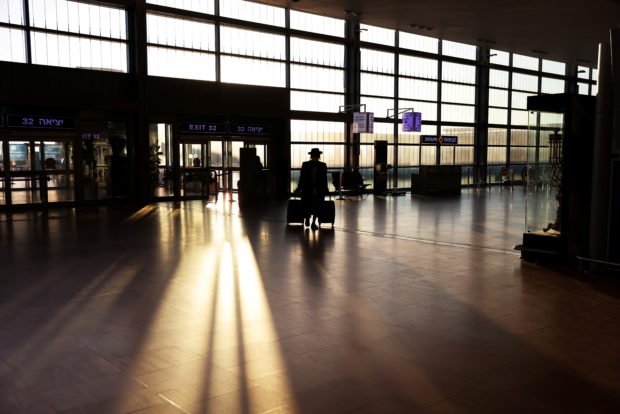Israel to shut borders completely over Omicron COVID-19 variant

A passenger arrives to a terminal at Ben Gurion international airport before Israel bans international flights, taking effect from Monday midnight until the end of January, in order to stop the spread of the coronavirus disease (COVID-19) and new coronavirus strains, in Lod near Tel Aviv, Israel January 25, 2021. REUTERS FILE PHOTO
JERUSALEM — Israel on Saturday said it would ban the entry of all
foreigners into the country, making it the first country to shut its borders completely in
response to a new and potentially more contagious coronavirus variant, and said it would use
counter-terrorism phone-tracking technology in order to contain the spread of the
Omicron
variant.
Prime Minister Naftali Bennett said in a statement that the ban, pending government
approval, would last 14 days. Officials hope that within that period there will be more
information on how effective COVID-19 vaccines are against Omicron, which was first detected in
South Africa and has been dubbed a “variant of concern” by the World Health Organization.
ADVERTISEMENT
“Our working hypotheses are that the variant is already in nearly every country,” Interior
Minister Ayelet Shaked told N12’s “Meet the Press,” “and that the vaccine is effective, although
we don’t yet know to what degree.”
READ:
Tighter border controls urged vs COVID-19 Omicron variant
Robredo’s ‘turnaround’ on NTF-Elcac’s abolition is ‘worrisome’ — Colmenares
Omicron coronavirus triggers more travel curbs worldwide
Petitioners claim Marcos failed to deny allegations in disqualification case
Israelis entering the country, including those who are vaccinated, will be required to
quarantine, Bennett said. The ban will come into effect at midnight between Sunday and Monday. A
travel ban on foreigners coming from most African states was imposed on Friday.
The Shin Bet counter-terrorism agency’s phone-tracking technology will be used to locate
carriers of the new variant in order to curb its transmission to others, Bennett said.
Used on and off since March 2020, the surveillance technology matched virus carriers’
locations against other mobile phones nearby to determine with whom they had come into contact.
Israel’s Supreme Court this year limited the scope of its use after civil rights groups mounted
challenges over privacy concerns.
The variant, which has also been detected in Belgium, Botswana, Hong Kong, Italy, Germany
and Britain, has sparked global concern and a wave of travel curbs, although epidemiologists say
such restrictions may be too late to stop Omicron from circulating globally.
Israel has so far confirmed one case of Omicron, with seven suspected cases. The Health
Ministry has not said whether the confirmed case was vaccinated. Three of the seven suspected
cases were fully vaccinated, the ministry said on Saturday, and three had not returned from
travel abroad recently.
Around 57% of Israel’s 9.4 million population is fully vaccinated, according to the Health
Ministry, which means they have either received a third shot of the Pfizer/BioNtech vaccine or
it has not yet been five months since they received their second dose. Israel has recorded 1.3
million confirmed cases of COVID-19 and more than 8,000 fatalities since the pandemic began.
Subscribe to our daily newsletter
For more news about the novel coronavirus click
here.
What you need to know about Coronavirus.
For more information on COVID-19, call the DOH Hotline: (02) 86517800 local 1149/1150.
The Inquirer Foundation supports our healthcare frontliners and is still accepting cash donations to be deposited at Banco de Oro (BDO) current account #007960018860 or donate through PayMaya using this
link
.
Read Next
In slap at China, US praises S. Africa’s detection of new COVID-19 variant
EDITORS’ PICK
MOST READ
Don’t miss out on the latest news and information.
View comments


